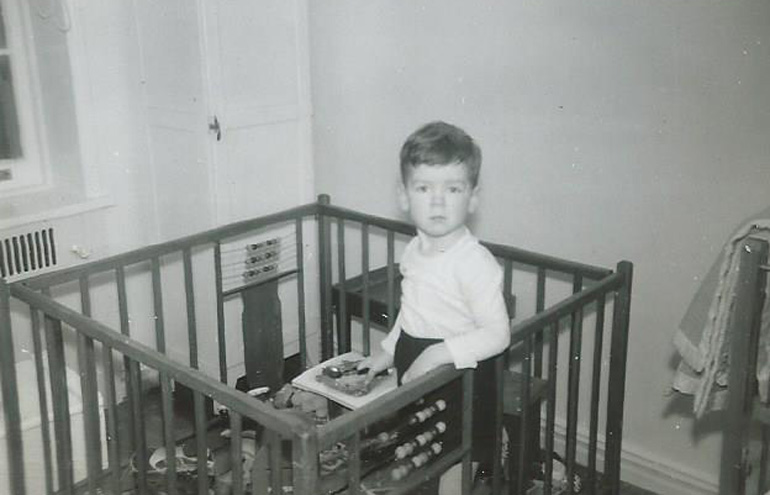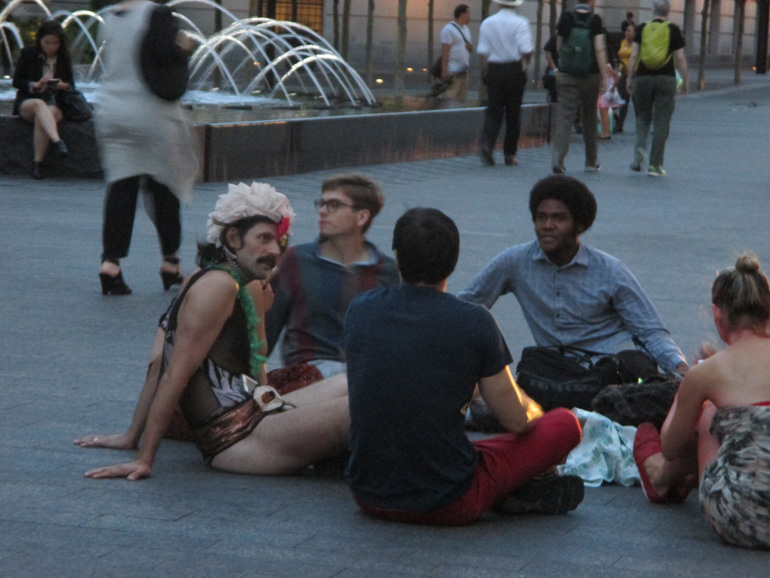Gotham Diary:
Marlow and Mevlut
November 2015 (II)
Monday 9th
Last week, there was a book review in the Times that I read even though I now can’t think why. Perhaps it was the photograph of Sam Phillips with Elvis Presley. I don’t know much about Sam Phillips, but I believe that the world would have been lovelier without him. And something inside me twisted with curiosity: what would Dwight Garner say? Would he say exactly what I expected him to say? It would turn out that he did. Perhaps I read the review because I was ready to take issue with what Dwight Garner had to say, not about Peter Guralnick’s new biography of Phillips, but about the cultural impact of Phillips’s career. Garner puts it all in one sentence: “It’s worth pausing, for a moment, to consider how lucky it was that Presley walked into Phillips’s studio and not someone else’s.”
It may have been lucky for Presley and Phillips, but it was a dismal conjunction for mankind. The brainlessly naughty confection of sex and music that flowed out of Sun Records’s Memphis studio was probably just as harmful to American minds as the chorus of disapproving clergymen and public officials feared that it would be, and no less unwholesome than that fountain of sugary drinks from which we are slowly weaning ourselves.
The following lines from Garner’s review manage to contain all the objectionable bits:
Phillips already had an aesthetic ethos. In some ways, he had prepared his whole life for Elvis’s arrival. Part of Phillips’s ethos, Mr. Guralnick writes, was his “sense that there were all these people of little education and even less social standing, both black and white, who had so much to say but were prohibited from saying it.”
Phillips wanted to pull music out of the drawing room. He sought maximum spontaneity, minimum polish. “To Sam,” the author writes, “if you weren’t doing something different, you simply weren’t doing anything at all.”
I don’t plan to complain about rock ‘n’ roll. All I mean to do is to point to the fantasy, the daydream, the sheer spell of magical thinking that is required for anyone to believe that “people of little education” are ever going to be capable of “maximum spontaneity, minimum polish” in the pursuit of grace.
I spell grace with a small g because there is nothing sacred about it. It is, however, a state of physical well-being second to none, and it ought to be no surprise that the harmonious alignment of the universe that occurs in moments of grace, radiating from one’s nervous system outward, is so often a response to music.
One such moment comes to mind. I wrote about the concert at which it occurred, a bit more than five years ago, but I didn’t say what I am going to say now. After a terrific performance of Beethoven’s Fourth Piano Concerto with Orpheus, Garrick Ohlsson came out for an encore. He played Chopin’s best-known waltz. It might have been a trivial moment, a cliché of classical music, but it was just the opposite. Ohlsson played the waltz, which everybody in the audience had heard doezens of times, as if it had never been played correctly, not even by Chopin: Ohlsson alone knew how it ought to be played, and he was demonstrating this to us as persuasively as a hypnotist. But instead of putting an authoritative spin on it, Ohlsson contrived to make it clear that the perfection of his rendition was a matter of the moment: he knew how the waltz ought to be played right now. That he was only playing a waltz was part of it, too. The music springing from the piano was too good to be “important.” It carried no baggage at all. That was maximum spontaneity, delivered with minimum polish.
How many hours, in years, had Garrick Ohlsson spent making music prior to that moment? And how many had I spent listening to it? But why bother with serious pleasures that take years to appreciate when a cheap thrill is instantly available?
My argument is not with Sam Phillips. There will always be uneducated people, and they will always find their satisfactions. My argument is with the educated people who believe that Elvis Presley’s impact on American life was culturally positive. It wasn’t. It was of a piece with the ossification of “high culture” that is implicit in Dwight Garner’s use of the term “drawing room.” It was a reaction, against the attempt to make a substitute religion out of art, that, instead of simply abandoning that attempt, devalued the art, dismissing it as “phony” — which of course it was, qua religion. Art had a problem, yes; but Elvis was not the solution.
Art has a different problem now. Who, after the decades of screaming fun that we’ve had since we took up singing about hound dogs, commands the neuronal fortitude for serious pleasures? When I ask that question, I consider the legions of smartphone-bound zombies stumbling about town, doomed to solitary, disengaged lives, and all but incapable of looking up and out. Do I think that smartphones are a blight? Not at all. They have simply allowed a massive cultural dislocation to express itself, much as the upper reaches of the Congo taught Conrad’s Kurtz who he really was.
“I am not disclosing any trade secrets. In fact, the manager said afterwards that Mr Kurtz’s methods had ruined the district. I have no opinion on that point, but I want you clearly to understand that there was nothing exactly profitable in these heads being there. They only showed that Mr Kurtz lacked restraint in the gratification of his various lusts, that there was something wanting in him — some small matter which, when the pressing need arose, could not be found under his magnificent eloquence. Whether he knew of this deficiency himself I can’t say. I think the knowledge came to him at last — only at the very last. But the wilderness had found him out early, and had taken on him a terrible vengeance for the fantastic invasion. I think it had whispered to him things about himself which he did not know, things of which he had no conception till he took counsel with this great solitude — and the whisper had proved irresistibly fascinating. It echoed loudly within him because he was hollow at the core . . . I put down the [spy]glass, and the head that had appeared near enough to be spoken to seemed at once to have leaped away from me into inaccessible distance.”
***
The problem of education — what is it for? — takes on an interesting light in the nonfiction writing of Orhan Pamuk. For Pamuk, education is a matter of Westernization. Traditional Turkish life appears to have no more need of higher education than European life did as recently as three centuries ago. You learn to read and write, and to sing a few patriotic songs, and then you are apprenticed into a business, if you are lucky. If not, you work in the fields. The idea of higher education is Western, and so is the course load; even a class in the sociology of life in Turkish villages is profoundly un-Turkish. Pamuk, who seems to have learned of and read the great European novels on his own, has set out to write European novels in Turkish just as Flaubert wrote them in French and Tolstoy in Russian. I expect that he is read mostly in translation.
It is ironic — almost unpleasantly so — that the novel advanced in high European culture at the same time that nationalism was undermining its social foundations. The central idea of nationalism was that every “nation” — tribe, clan, race, whatever; just don’t try to make too much sense of this concept or it will dissolve in your hands — is different, and ought to be allowed to govern itself. The main idea of the novel is that all nations are the same (comprised of human beings), notwithstanding colorful local variations. For a long time, it was hoped that nationalism had climaxed in the long Great War of the Twentieth Century, but not only is it resurgent today, it has taken on an extra dimension. There is a feeling abroad that rulers — political élites — are as foreign to their subjects as the Viennese were to nineteenth-century Hungarians. Nor is this feeling inexplicable. The Syrian refugee crisis has thrown a harsh spotlight on the confusion within Western élites, as well as an unflattering one on those who, like Angela Merkel, seem determined to ignore the confusion. The irony here is even more unpleasant: “Syria” is a Western concoction, the result of a scheme devised by a man from France and a man from Britain. How nice it would be for the West if the Sultans and the Shahs resumed control of those regions. (It’s a pity that they weren’t very good at it before the Europeans stepped in. But they seem to have been more effective, and in any case less lethal.)
Thanks to American “pop culture,” in fact, it is not unreasonable to speak of “Westernization” is something that even Europeans and Americans must undergo if they are to understand where they actually stand. They must teach themselves somehow — for who is there to teach them? — about the core Western value: impatience with ignorance. No one, in the proper West, has the right to be stupid, or to remain uneducated. There is only the misfortune.
***
Tuesday 10th
Yesterday afternoon, I finished reading Heart of Darkness — for the third time, I suppose — and I immediately felt that I had missed it somehow. Well, I had missed it by picking it up here and there at various hours and reading on for many pages or a few. I had read too much of it late at night. What I had missed was the impact of Conrad’s narrative blow. I could see that it was there to be felt, and that I’d missed it by not paying attention in the right way.
Conrad’s obliquity is, to me, the heart of the story. I understand that Heart of Darkness is “about” the evils of colonialism and the illusion of moral progress. It is also about the silliness and uselessness of women. Several times, Marlow surmises that the world would simply come to an end if European women knew what their men got up to on their adventures. It is very easy to brush this apparent misogyny aside, and it is just as easy to overlook the implicit sermonizing about colonialism and depravity. What makes Heart of Darkness great is not the gruesome confrontation between Marlow and Kurtz, or Marlow’s appalled encounter with the bloody paganism to which Kurtz has “descended.” These revelations always mark the climax of dramatizations of the tale, and they make for very good cinema. But they don’t occur in Conrad’s book.
There is a linear thread in Heart of Darkness, in which chronological order more or less determines the arrangement of the scenes. Marlow takes his leave of Europe — Belgium — sails down the coast of Africa to the mouth of a great river, the unnamed Congo, and then proceeds on foot (if I am not mistaken) to an upriver station where he finds the ruin of a paddle-wheeler that he is expected to repair and then sail further into the interior. He has been hired to take the place of a captain who was killed in a fracas with the natives. All this has nothing to do with Kurtz. Kurtz is introduced to Marlow by various agents of the company that has hired him. Marlow is alternately piqued and bemused by this Kurtz fellow, and begins to look forward to meeting him. Meanwhile, the Marlow who is telling the story, years later, so shades things that we gradually understand, as the younger Marlow couldn’t have done, that Kurtz is at the center of the story.
The linear thread proceeds through the novella’s three sections. Marlow goes up the river; he comes down the river and goes back to Europe, where he has the somewhat chilling, hallucinatory meeting with Kurtz’s “Intended” — to call her a fiancée would miss the point. But more about her some other time. My interest is in the packets of information about Kurtz that Marlow-the-narrator discloses from time to time. At first, he shares the contents of these packets as and when the younger Marlow receives them, as information from the agents. But then, in the middle of the second section, and also in the middle of a violent attack on the paddle-wheeler, Marlow opens an enormous parenthesis and spreads out the contents of another packet of information.
It happens when Marlow’s helmsman is killed by a spear hurled from the shore, and a passenger comments that Mr Kurtz is probably dead by this time, too. All the younger Marlow can think of, in his frenzy to remove blood-soaked shoes, is the disappointment of not getting to meet Kurtz, about whom he has overheard some very intriguing things. Marlow-the-narrator quickly takes control of the parenthesis, filling it with details about Kurtz’s background and attaching accounts of conversations that have not yet taken place. It is from these that we learn of Kurtz’s high-minded purpose, of his intention to bring the glory of European order and civilization to the benighted tribes. Marlow tells us about the exalted tract that Kurtz has written on the subject, noting that there are “no practical hints” as to how the suppression of savage customs is to be accomplished — unless, he concludes mordantly, it is the “post scriptum” scrawled at the end of the tract, “Exterminate all the brutes!” But the real brute is of course Kurtz himself. Kurtz has given up high-mindedness and taken the low road to the acquisition of mountains of ivory.
We filled the steamboat with it, and had to pile a lot on deck. Thus he could see and enjoy as long as he could see, because the appreciation of this favour had remained with him to the last. You should have heard him say, “My ivory.” Oh yes, I heard him. “My Intended, my ivory, my station, my river, my — ” everything belonged to him. It made me hold my breath in expectation of hearing the wilderness burst into a prodigious peal of laughter that would shake the fixed stars in their places. Everything belonged to him — but that was a trifle. The thing was to know what he belonged to, how many powers of darkness claimed him for their own.
Presently the parenthesis closes, and the body of the helmsman is thrown overboard into the river, a “simple funeral.” It is now that Marlow paddles the boat up to Kurtz’s station, where, in the third section, he finally meets the dying Kurtz.
What fascinates me is that it is the middle of a melée, a skirmish that is not easy to follow (they never are), Conrad piles on to the harried reader the essence of Kurtz’s lurid crimes. It is true that he will flesh this out in the final section, with the shamans, Kurtz’s acolytes, wearing horns that are silhouetted by blazing fires — all the rigmarole of hell. The ornamental finials atop the palings that surround Kurtz’s residence turn out to be human heads. There is enough gore to make the first-reader’s hair stand on end. But Conrad has drawn the shock of this nightmarish scene by telling it to us in advance.
What I am trying to make out is that Marlow-the-narrator prevents the reader from experiencing “the horror” as he himself did. He tells us the nature of the horror before letting us see what it looks like. This is an “error” that the movies correct. Probably wisely. But books are different. They contain a very different kind of information. Sometimes, the information in a book and the information in a filmed adaptation of that book overlap perfectly — I’m thinking of the “We’re going to Europe” scene, complete with tornado warnings, from Mr and Mrs Bridge (I forget which novel the scene appears in). Mostly, however, this does not happen. In Heart of Darkness, Conrad deposits some very disturbing but quite lucid information about Kurtz in the middle of a very disturbing and anything-but-lucid shoot-out. What we learn about Kurtz prepares us for the fragmentary sequences of the third section, not only telling us something about what to expect but trailing the violence in which we were told. I’m not sure why Conrad goes to the trouble to diffuse his story, but I believe that he makes the most of it.
To read Heart of Darkness properly is, at a minimum, to read each section in one sitting. Preferably in broad daylight.
***
Heart of Darkness is familiar to filmgoers as the source for Francis Ford Coppola’s Apocalypse Now. There is also Nicolas Roeg’s 1993 adaptation, with John Malkovitch and Tim Roth. But no one ought to miss the 1958 Playhouse 90 version. Roddy McDowell is Marlow and Boris Karloff is Kurtz — now, how can you beat that? Unfortunately… Stewart Stern’s teleplay is something of a Frankenstein: it is possible that there are no scenes at all that can be said to taken directly from Conrad. There is a great deal of sheer fabrication. A character called “Maria” (Inga Swenson) seems to be based on The Intended, but it’s a lot more complicated, you see, because in this version Marlow grew up in Kurtz’s house, and played with his daughter, who fell in love with him (but not he with her, it seems). The poor girl may also be dotty. Marlow must find his father-figure, so he crosses a forbidding threshold only to be confronted by Cathleen Nesbitt, cast quite against type, and Oscar Homolka, who plays himself. All of this is wrought on a dark set that is powerfully redolent of a genuine bad dream. Next thing you know, McDowell is stripped to the waist and shackled with a neck iron. Eartha Kitt appears as “the Queen,” then retires to her curtained sedan chair, in which she is discreetly slaughtered. I happened to watch this farrago before re-reading the book, and was therefore condemned to a semi-demented attempt to remember whether this bit or that bit could have come from Conrad’s pen. It gave me the worst headache.
Of course, the production values are threadbare. Part of this is the technology — I expect that the recording was made on a kinescope, not film — but part of it is the aesthetic of the day; I can remember seeing things much like it on my first forays onto Off-Broadway. Were Stewart Stern to turn out to be an alter ego of Paddy Chayevsky, I shouldn’t be at all surprised. Most of this production makes little or no sense, but it is highly symbolic and obviously important. I found it a compelling document of the confusion into which the Cold War plunged most thinking Americans. It also records politically incorrect ideas about deploying African characters in a drama about Europeans. On the whole, it is more interesting than it is awful.
The DVD is a complete entertainment experience: you are there, huddled in front of the tube. There are station breaks for Channel 2 New York (CBS), and there are two commercials, both of operatic length compared to today’s quick spots. One is an infomercial about kitchen appliances powered by natural gas. It stars Fred MacMurray and June Haver as thrilled homemakers. The other commercial is genuinely weird. It’s for Kleenex napkins, and it features this miniature butler person who recommends Kleenex napkins to gigantic human beings because the product doesn’t slip off your lap. It could pass for a fragment of The Twilight Zone.
Did I mention that Boris Karloff is also stripped to the waist? We see him as we never do in the book, with a cute crown of bones on his head.
***
Wednesday 11th
M le Neveu came to dinner last night. We haven’t seen much of anybody in the past year or more, what with all our upheavals, but we really haven’t seen anything of my cousin, whom I speak of as a nephew because of the generational space between our ages. My conscience was quite pricked, but weeks would go by without my doing anything. Finally, I sent a text, and it was that simple. Le voilà. While we waited for Kathleen to get home from work, we talked about matters high and low; I had recently read Patrick Coburn’s piece about Syria, in the current LRB, and was anxious to see if I’d learned anything from it, so we talked about the futility of the American program there, and then about the Kurds. I have always believed that Kurdistan is the ultimate Middle Eastern problem, one that nobody really has to deal with now, because of other crises, but one that will have to be settled before than can be real peace in the region. I floated my latest what-if, which I touched on here the other day (scroll up): What if we simply gave up on the idea of Arab self-governance and redistributed the territories created by the Sykes-Picot agreement to Turkey and Iran, with Iraq’s Anbar Province serving as the desert boundary between them. Perhaps this enlarged Turkey, or Turkish Empire, or Sultanate, or call-it-whatever, would find the confidence to grant the Kurds autonomy in their own region. M le Neveu found all of this very unlikely. Of course it’s unlikely — now! (Erdoğan can’t live forever.) (Nor is Saudi oil unlimited.)
Closer to home, I surprised myself by saying something that I found I really believe: the American voter deserves to be spanked, or at least shamed in public. The case needs to be argued (there’s no need to trouble to make it) that American voters have really let democracy down. Otherwise, campaign finances wouldn’t be the issue that they are. The awful truth is that the movement to limit campaign funding is really aimed at cutting down the number of atrocious advertisements. But these paid-for messages have no intrinsic power at all. It is only when some moron plops down in front of the television, watches one, and lets himself be persuaded by it that we have a problem.
I was tempted to speak just now of the average American voter, of course, because I am an American voter, and I think I’m doing a pretty good job of voting with my brain. But there are two kinds of average American voter, and one of them doesn’t even bother to vote. Another scheme that I floated, just for my own entertainment, was one for buying American votes. Or rather, for paying people not to vote. Quite aside from the, er, legal problems confronting such a scheme, how might it play out? We could call it the Cultivate Your Garden project, and extremists on both sides would have the lushest gardens, because they’d have to be paid more to stay at home. Billionaires would be offered tax credits instead of cash bounties — for as long, anyway, as billionaires were tolerated at all.
M le Neveu mentioned Andrew Jackson at one point — the president who would take the place of Brutus, if I were rewriting The Inferno. Jackson effectively eradicated the influence of the Framers in American politics: they stand their on their marble plinths, but the élitist democracy that they envisioned was scrapped forever by Jackson’s populism.
I don’t know how people can bring themselves to watch the Republican Party debates. I read about them in the paper next day and I shudder at the ugliness and the incompetence. I have no desire to see demonstrated what I already knew, which is that Jeb Bush is simply not scrappy enough for real political competition. He may be the family’s genius, but he’s a back-office man, a policy wonk. You don’t put people like him in front of the cameras and the commentators for long. It’s nice to read that Trump actually got booed, even if it was for picking on Carly Fiorina, a woman who deserves, at the very least, the torments of Prometheus. I remain terrified of Ted Cruz, simply because he reminds me of Richard Nixon, the president whom I would partner with Andrew Jackson in the depths of Hell. I ask myself: how will Ben Carson disappear? Will he fade away, or will a yawning pit of disgrace open beneath his feet? He seems so vague that, if indeed the latter were to happen, he might not actually fall in. Either way, it will be an embarrassing spectacle, and I’d prefer to read about it afterward.
But behind all of these cardboard ogres stands the Republican Party voter. Or rather, a voter who, we are told, wants to stop government. How this does not add up to treason is beyond me. But I don’t want to indulge the online writer’s zest for imaginative insult and contumely. My real problem with the American voter is football. I can remember when football was weekend entertainment, something that happened on crisp (sometimes rainy) fall Saturdays. Now, like so much entertainment in this country, it has degenerated into a tribal hearth before which brutal, life-threatening rites are performed in antic slow motion. Rich white guys cheer as big black guys knock the crap out of each other. In the current issue of Bookforum, Matt Hinton writes about a book by Florida State professor, Diane Roberts, Tribal: College Football and the Secret Heart of America. The only thing wrong with the title, as Hinton points out, is that there’s no secret.
But for Roberts, as for nearly all fans who remain in thrall to the game against their more-enlightened cultural judgment, the lure of the stadium and the tailgate is something akin to a genetic imperative.
In fact, there is no genetic imperative, and there isn’t really a tribe, either, just the televised simulacrum of one, a bogus, self-generating excitement that requires little more than a wave of noise in the background. There is nothing, nothing at all authentically primitive about American football. It is entirely contrived, manufactured to distract its participants from the unpleasant realities of social injustice and inequality and, more to the point, of pointless consumption. Football feeds America the flattest, if loudest, possible “good times.” Yelling until you can’t hear yourself think is the point.
Hinton tells us that Diane Robert quotes Hazlitt: “Without something to hate, we should lose the very spring of thought and action.” It seems to me that the whole point of a humane education is to overcome this impulse, and to learn how to care for and about things without being prodded by hostility or possessiveness. As always, what grieves me is the enthusiastic participation of a college professor in this orgy of self-bullying.
How can such a populace, so addicted to such pastimes that they are no longer pastimes, cope with the issues facing a democratic electorate? And let’s bear in mind that the issues that come up for public discussion are all issues that concern voters directly, or that journalists have convinced voters to regard as central. So far as I know, no Republican candidate has bothered himself or his listeners with the Export-Import Bank, or with the wave of anti-competitive mergers that is sweeping the health, beverage, and railroad sectors — all of which actually do impinge on voters. What about the lousy record that we’ve racked up over the past fifty years — since Korea, really — as military losers? Why have Americans been so slow to realize that what they mean by a “strong military presence” is almost invariably an ineffective one? It’s appalling to think that our policies about dealing with China’s occupation of the South China Sea are in the hands of people who could barely find the Spratly Islands in a dictionary.
This is what I’m talking about when I complain that Americans apparently maintain a belief that they have the right to remain uninformed and ignorant, itself a manifestly stupid way of looking at the world. I’m not surprised that Americans or anyone else are more concerned about local excitements than about abstract policies. But abstract policies have very real consequences, and I believe that the whole point of democracy is to give men and women a reason to pay attention to such things. If democracy itself is not a form of education, then it cannot amount to more than a demented beauty contest. It ceases, in effect, to be democracy at all, and loses its status as better than all those worse forms of government.
***
Dinner was terrible, I thought. It had been a long time since my last stab at steak, potatoes, and green vegetables. I seem resistant to the idea of simmering frenched green beans in a large pot of water — why? So the beans were underdone. As for the potatoes, they used to be a specialty that M le Neveu was very fond of: chunks of sweet potato roasted in oil and rosemary, with just a touch of honey. I seem to have lost the knack — I never wrote down a recipe. Last night, I forgot the honey, failed to butter the baking dish, and ran the oven too low. On top of everything else, the potatoes were tepid when they reached the table. There was nothing wrong with the steak, but nothing very right about it, either; it didn’t taste like much of anything. A menu that I used to turn out week after week, to M le Neveu’s delight, reappeared pallidly at best. Kathleen thought that my criticism was exaggerated, although she agreed that the beans were underdone.
Last Saturday night’s dinner was another story. Aside from setting an unusually handsome table, complete with my late mother-in-law’s monogrammed linen napkins, I served at least one boffo dish. It was really the marriage of two everyday preparations. To a the purée of a very nicely-done curried butternut squash soup (with apples) I added spoonfuls of fresh corn sautéed in butter and oil with tarragon. (Ordinarily, I season the corn with oregano, but tarragon worked better, as I thought it would, with the overall sweetness of the soup, instead of pointing it up as I fear oregano would have done.) The blend of smooth and crunchy was perfect. I wasn’t nearly as pleased with a warm tortellini salad, with chopped cherry tomatoes and oil-cured olives. The olives were a mistake; I ought to have used milder green olives. And the tortellini — this is a bone that I’m always picking with Agata & Valentina — were doughy. But it was a start. I’m drawn to the idea of a pasta dish that does not involve a sauce, especially a cream sauce. The veal that followed, made according to Elizabeth David’s method, was a hit.
What will it be for dinner tonight, pizza or stir-fry?
***
Thursday 12th
The weather is dark, but I don’t mind. I’m in a very wrapped-up state. Partly, it’s The Strangeness In My Mind. Last night, as I was waiting for Kathleen to come home, some helicopters were making a racket overhead and I wondered, rather inconsequently, if I were in Istanbul or New York.
Hüzün, I believe, is the word that Orhan Pamuk uses to describe his feelings for his home town. According to my dictionary, it means sadness, sorrow, grief and only then melancholy. In Pamuk’s hands, this melancholy is a pleasure. Well — in my hands, rather, as I read Pamuk’s book in my tidy apartment. I am not surrounded by dust and broken glass and chipped marble and all the other signs of physical decay that Pamuk lingers over. I think that I should find them simply depressing, perhaps hideously depressing. My hüzün is purely poetical. It is very quiet here, but it is not the quiet of a remote farmhouse. It is the sweet melancholy of solitude in the city.
It has been a while since I read The Black Book, Pamuk’s first succès d’estime. I don’t think that it was ever much of a success in Anglophonia; it’s the kind of vaguely absurd, vaguely nightmarish novel that one associates with experimental European fiction. As I recall, some poor sap has to find some papers and bring them to a certain place by a certain time, or else. This wild goose chase provides the armature for meditation on many secular matters, mostly pertaining to old, Ottoman Istanbul. Wasn’t there an assassinated columnist in there somewhere? These curiosities have reappeared in Pamuk’s nonfiction, notably Istanbul and Other Colors, but they also reappear in The Strangeness In My Mind, if in a new dimension. At the macro level of criticism, Strangeness is a novel about the interior immigrant who moves from rural poverty to urban opportunity. Such novels have proliferated in every developed country, and in every country the story is slightly different, because rural customs are peculiar. But there is more to it in Istanbul. In the European, American, and even Asian versions of this basic story, the city is not very old. There may be an old building here or there, but the city is new; that is its great point of distinction from the country. Istanbul, in contrast, has not been new for several millennia. Istanbul itself is a migrant, an ancient town, with crooked streets and crooked history, trying to hold on to its identity in the modern city that has sprouted alongside it and that tends to pave over it. The old Istanbul was built of vulnerable, breathing wood; the new is a pile of dead concrete. The Anatolians who come up from the country live on edges of the city that will themselves soon become centers within the city; these newcomers rarely see the old Istanbul.
Our hero, Mevlut, is different. As a street vendor working the neighborhoods around Beyoğlu, the part of town that used to be populated by Europeans and Greeks and Armenians (the Genoese called it “Pera”), straddling the hills on the other side of the tidal inlet known as the Golden Horn from the heart of old Constantinople, Mevlut knows what passes for the old Istanbul, the houses and the wrecks of houses built at the end of the Nineteenth Century and the apartment buildings thrown up between the wars. But there are plenty of buildings older than that, and they are all shabby and neglected, because the Europeans and the Greeks and the Armenians have at one point or another been evicted. Today’s old Istanbul is the husk of a once-cosmopolitan city. As in Shanghai, however, it was always the foreigners who were cosmopolitan, not the Turks themselves. Mevlut’s problem is that he finds this jumble mesmerizing. I don’t think that he knows very much about history or foreigners, but Beyoğlu not only allows but encourages Mevlut to let his imagination play upon what he sees.
Instead of putting himself into his career, Mevlut daydreams about other people. His behavior, however, is conservative, bound by what I think of as the hygiene of tradition. Tradition, in this case, militates against the social intercourse of men and women. As such, it constitutes an array of obstacles that no novelists could disdain. Pamuk has concocted a love story for Mevlut that has an agreeably fabulous edge to it; it serves the purpose of providing a bridge for Pamuk’s interesting characters to cross from the beginning to the end of the book. To me, this love story, while charming in places and not without heartbreak, seems more nakedly a function of the sexual imperative than love stories are in the West: happy Turks do not ride off into the sunset alone; they have children, and their children have children, and so the wheel turns. To put it another way, love is not envisioned as the individually transformative thing that it is thought to be in the West. It goes the other way: love is an expression of the person you already are. Therefore, while Mevlut can nurse a passion for his loves that is as obsessional as passion anywhere, this passion does not really change him. Instead, its gratification allows him to slip happily into his traditional adult role.
As I think I’ve already said, The Strangeness In My Mind reads very straightforwardly. It presents none of the obscurities of The Black Book; one can almost imagine a Disney adaptation. I wish I were knowledgable enough to take the measure of Pamuk’s Turkish, which I suspect is not quite so artless as Ekin Oklap’s English. I also suspect that the text is rich in unobtrusive allusions that only a Turkish reader could be expected to catch. What I cannot decide is whether Strangeness is more than a vehicle for the author’s encyclopedic grasp of Istanbul’s moods. I am also intrigued by the possibility that this novel is intended to appeal, frankly and invitingly, to Turkish readers. Mevlut’s godliness is a key element of the story because it signifies Mevlut’s acceptance of his world. As a byproduct of his active imagination, perhaps, Mevlut is the character, among all his friends and neighbors, who is least altered by the move to Istanbul. Most people who know him think that Mevlut is innocent; Pamuk tells us at one point that this innocence is actually optimism. But I think that Mevlut is simply imaginative. Not in making things up, but in imagining the lives of others — including the lives of the dead. Imagination allows Mevlut to inhabit his world more fully than others do.
And yet one cannot silence the thought that, in Mevlut, Pamuk has drawn a what-if self-portrait. What if Pamuk had grown up poor? What if he had not had a father who urged him to read Flaubert and Tolstoy? What if no one in his family had understood the point of education, but merely regarded it as useful? What if Pamuk had started working at the age of eleven?
It’s this that makes me wonder how Pamuk knows how people like Mevlut live. How can he? Only through his imagination, I suppose — which is why I wish Turkish criticism of the novel were more accessible.
I have two chapters and forty-odd pages to go.
***
Last night, Kathleen and I watched a video of Mike Leigh’s Mr Turner. We were not sure what the story was. If the heart of the film is Turner’s relationship with Mrs Booth, the Margate landlady with whom he eventually settled down in Chelsea, we don’t hear its beat quite often enough. Leigh makes no attempt to present or describe the demons, so to speak, that put Turner’s work so far ahead of its time; we are simply to take him as a genius. Turner’s role as a Cockney rebel against the grandees of the Royal Academy is blunted by his rather magnificent (if somewhat peculiar) decorum. Timothy Spall, playing the artist, gives us a rhinoceros in a frock coat — a force of nature, but, like all forces of nature, profoundly conservative. I wish that Leigh had gotten him to say more than just “Claude Lorrain was a genius!” I mean, something more about Claude.
There are more characters that the story knows what to do with. John Ruskin and his parents make an appearance that, like Turner’s association with Lord Egremont at Petworth, seems illustrative of a point that is never made. (Although Joshua McGuire is deliciously fatuous as Ruskin.) Then there is the sex — the opportunistic sex that Turner has with his deformed housekeeper, the sex that is alleged to have produced the two daughters of a harridan former lover, and of course the sex with Mrs Booth. Happily, the sex with Mrs Booth is not just sex, but companionate affection, and we don’t see much of it. That’s to say that we never see any part of Marion Bailey that we oughtn’t. Kathleen especially thought that Bailey was the star of the show. I suspect she regarded Mrs Booth’s combination of flexibility and reassurance with keen fellow-feeling. Certainly, if I add Mr Turner to our DVD library, it will be because of Marion Bailey’s performance.
I’ve just pulled out the catalogue from the 2008 Turner show at the Museum. It opened to what was my favorite thing in that show, for some no longer excavatable reason, the watercolor of Merton College. “The Sun is God!” — Turner’s last words. The sun is hiding today, and I’m in no hurry for it to reappear.
***
Friday 13th
As usual, I had cheated. I’d read the last page of The Strangeness In My Mind long ago. Or at least I’d glanced at it; and a glance was enough to make out the last line, “I have loved Rayiha more than anything in this world.” For some readers, this may be a sweet resolution of Mevlut’s life. For me, it jangles with horrible ironies.
For Rayiha is dead, and has been dead for a long time. A lot of good this love will do her. We have known since the end of the first chapter that her life would be “brief.” I did not cheat there. I did not try to find out, ahead of time, the reasons for Rayiha’s untimely death. For a while, I entertained the guess that she would die as collateral damage in a shootout between her brother-in-law and her husband’s cousin, not over her but over her younger, prettier sister Samiha. That would have been exciting. But Orhan Pamuk had something darker in mind, something almost tragic. And although it is true that Mevlut loved Rayiha, and loved her from the first moment that he saw her smile, he did nothing to help lift the misery into which circumstances dropped her. His contribution to her despair was twofold: he refused to clear up the matter of the letters that he had written to her before their marriage, and he did nothing to help her out with an unwanted pregnancy. In my view, Mevlut killed the woman he loved more than anything in the world.
This may not be a Turkish view — it may not be imaginable to Turkish readers. After all, Rayiha did take things into her own hands; Mevlut never laid a finger on her. Rayiha would not let the matter of the letters drop. (They had in fact been intended for Samiha — that cousin of Mevlut had tricked him about the sisters’ names. This same sneak would later poison Rayiha with intimations of the truth.) Rayiha was something like Elsa in Lohengrin: she wanted an assurance that would not be granted. I felt terribly sorry for her in those last chapters of hers, as she floundered in her wretchedness. And all the while, money worries. I am not certain that this novel would not have been better titled Mevlut the Lovable but Improvident.
The problem is that Mevlut’s behavior was perfectly correct — correct for a loving husband. I don’t mean to suggest that he was a hypocrite; he always believed that he was doing the right thing. It is true that his good behavior had a distinctly passive tinge. Mevlut always hoped for the best. He hoped, for example, that once it became too late for Rayiha to obtain an abortion, she would come round to accepting her pregnancy, and he would at last be the father of a son. At the same time, this behavior was utterly free of macho posturing. Mevlut was almost incapable of insincerity. But the culture in which he grew and made his way deprived him of the ability to assess the danger in which Rayiha struggled. So his melancholy but contented summing-up at the end struck me — smack! — as brutally complacent.
For the time being, I’m done thinking about this novel. I shall let it steep as it will. I look forward to seeing how it does, and what other people have to say about it. As I say, I wish I could read some Turkish criticism of the book. I am hoping, even though I don’t understand quite how this would happen, that The Strangeness In My Mind will find its place among the great European novels. Despite its modesty and its simplicity — mere appearances, perhaps — this is Pamuk’s greatest achievement so far. If it becomes a great European novel, that will be because it is a great Turkish novel.
***
Two of today’s Times Op-Ed pieces, taken together, persuade me that, if we manage to live so long, there will be great changes on the American political scene in about ten years. That is when the Millennials will begin to arrive at middle age. (Matthew Klein: “A Lost Generation of Democrats.”) By then, too, a very significant portion of the ever-ageing conservative cadre of the Republican Party will have died. David Brooks:
And so the large question Republicans must ask themselves is: Are we as a party willing to champion the new America that is inexorably rising around us, or are we the receding roar of an old America that is never coming back?
Ten years is plenty of time for new issues to swamp our attention, and other problems may cause “immigration” to lose its hot-button status. But the Millennials will still be in position to decide what is to be done about the Democratic Party, and Republicans will have lost a big chunk of its extremist base. My hope is that both parties will be dead by then, with new coalitions rising from their ashes. The idea of new parties is frightening — it ought to be! But the Democratic Party has been moribund since the Reagan years, and attempts to keep it going on temporizing life-support have alienated voters. The Republican Party is being torn apart by the tension between wealthy donors and relatively unsophisticated but impassioned supporters.
Behind all of this reality-show politicking stands an array of government structures in sore need of rethinking. One of the things that I like about Millennials is their recognition of genuine expertise: they may be the first generation since World War II to be honest about the need for élite regulation, which is essentially the need to pay qualified regulators well enough to keep them at their desks, and not on the hunt for more lucrative work in the businesses that they’re supposed to regulate. The New Deal regulatory structure is well past retirement age; among other things, I should suggest transforming the Administrative Procedure Act with a blast of online, digital wizardry. What I’m hoping is that Millennials are already scratching their heads.
What I don’t take for granted is that Millennials have a better grasp of the vital importance of humane thinking than their elders. The easiest way to say what “humane thinking” means is to contrast it to mechanical thinking, to formulaic thinking — to systems. People can operate systems, and they can oversee mechanical operations. But they cannot be subjected to these things without blighting the species. To pay a normal person to perform a mindless job is to place that person in moral equivalency with sex workers. I hope that Millennials will come to their senses about Silicon Valley, and understand that, while it provides amazing services, it is not the source of viable political templates. I often think that data engineers are lulled by the ease with which files can be overwritten: this is not a metaphor for social life.
***
Social life. That’s what Kurtz ran off to Africa to flee, and the disinhibiting absence of social life there exposed him to corruption. There is a myth abroad among men: great men stand alone. Great men suffer alone, fight their demons alone, wrestle with existence alone. But why is it that they never do the laundry or unload the dishwasher alone?
***
Bon weekend à tous!





















